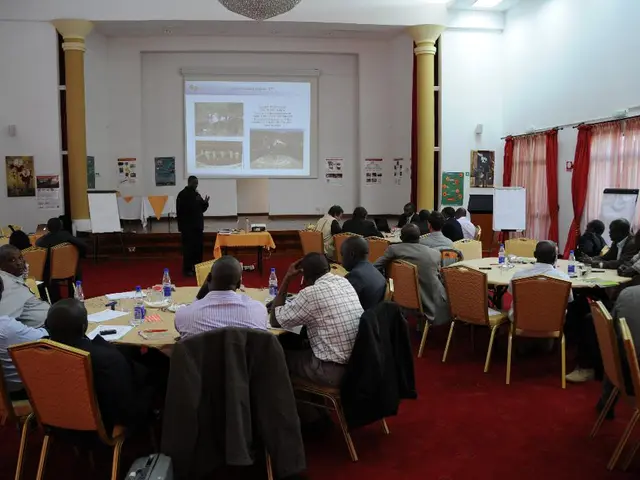Various Techniques to Break Free from the Negative Cycle
Are you constantly feeling ticked off at your job? When dissatisfaction becomes a recurring theme, it impacts both your work performance and your well-being. Here's how to identify and break free from the negative spiral.
The irritations might seem trivial - another pointless email, a colleague chatting at the wrong time. But if these incidents get under your skin, you could be sliding into a continuous loop of dissatisfaction. Ragnhild Struss, a career coach, says, "One bad thought sparks another, and it just grows if not addressed early."
Recognizing the Negative Spiral
Recognizing when you're stuck in the rut isn't always easy. Small annoyances pile up until they become unbearable. Laura Venz, a professor of work and organizational psychology, suggests keeping a journal to track your thoughts, feelings, and reactions. Listening to feedback from peers, superiors, friends, or family members can also help you become aware of the issue.
Different people react differently to negative situations, and some might not notice their spiral until it's progressed significantly. Perfectionists or those who work excessively might miss the signs. On the other hand, those who are mindful and reflective tend to spot the issue sooner.
Warning Signs of a Negative Spiral
- Persistent irritation
- Frequent anger outbursts
- Increased conflicts at work
- Hopelessness or powerlessness
- Burnout symptoms like exhaustion, sleep disturbances, or headaches
- Decreased motivation and withdrawal
- Concentration and memory problems
- Decision-making difficulties
Breaking the Cycle
In the Heat of Frustration or Overload
In critical situations, Struss recommends taking a deep breath and mentally distancing yourself from the stress. Mindfulness exercises, breathing techniques, or quick body scans can help clarify what's happening and prevent impulsive reactions.
In the Long Run
To combat the cycle, first, analyze your situation. Is there a way to reduce your workload? If necessary, work on managing stress better, improving conflict resolution skills, or finding time for relaxation.
However, don't ignore the role of your manager. If they're part of the problem, you might need to consider a job change.
Preventing it from Happening Again
A negative spiral is an indication that your work environment isn't aligning with your personality. Ragnhild Struss suggests "job crafting" as the essential tool to consciously shape your job to better fit your personality, needs, and skills. This involves focusing on tasks, work methods, relationships, and attitudes to achieve sustainable satisfaction.
When to Seek Professional Help
If you can't escape the cycle on your own or if it displays pathological traits, it's time to seek professional help. Professional reflection through coaching or psychological support can help you establish new, helpful patterns to break the negative cycle for good.
[1] Troja, L. (2021, February 2). Distress among employees increases. Retrieved March 22, 2022, from https://www.heute.de/karriere/arbeitsplatz/stress-arbeitsbelastung-konsequenzen-trotz-corona-trotz-homeoffice-distress-unter-employees-austausch-aoe-konsequenzen-ist-hoch-arbeitskrueppel-sein-mindestes-maessesalat-entbehren-sollten-unter-queren-verfallsen-85411282.html[2] Kube, E. (2021, October 26). Goodbye stress, burnout, and bad chemistry - six ways to boost your work motivation. Retrieved March 22, 2022, from https://www.heute.de/karriere/motivation/6-wege-um-arbeitsmotivation-zu-steigern-ausdauerstraining-tagesablauf-organisation,e-learning,management-mindset,empowerment-93340850.html[3] Kube, E. (2021, September 14). Positive feedback - a seriously underestimated performance booster. Retrieved March 22, 2022, from https://www.heute.de/karriere/performance/positives-feedback-seriös-unterbewertet-arbeitsergebnis-steigern,foerderung-93150700.html[4] Toutsikas, J., & Tavares, M. (2015). Verbal aggression in healthcare organizations. Multidisciplinary Journal of Educational Strategies, 11(S3), 64-80.[5] Xanthopoulou, D., Katsarou, P., & Cox, P. T. (2009). The impact of frequent negative feedback on job performance and turnover intentions: The role of job satisfaction and organisational commitment. Journal of Organizational Behavior, 30(8), 967-980.
- Embracing a community policy that advocates for workplace-wellness and health-and-wellness, including mental-health initiatives, may help prevent the negative spiral in the workplace.
- To foster personal-growth and career-development, one may consider enrolling in vocational training programs that provide opportunities for education-and-self-development, thereby improving job satisfaction and reducing the likelihood of a dissatisfaction cycle.
- In addition, implementing mindfulness practices and stress management techniques can help individuals tackle frustrations and overload more effectively, fostering a more positive environment in the workplace.
- If the negative cycle persists, it may be beneficial to consult a professional, such as a coach or psychologist, to address deep-seated issues that impact mental health and overall well-being, and to learn strategies for achieving sustainable career development and personal growth.







